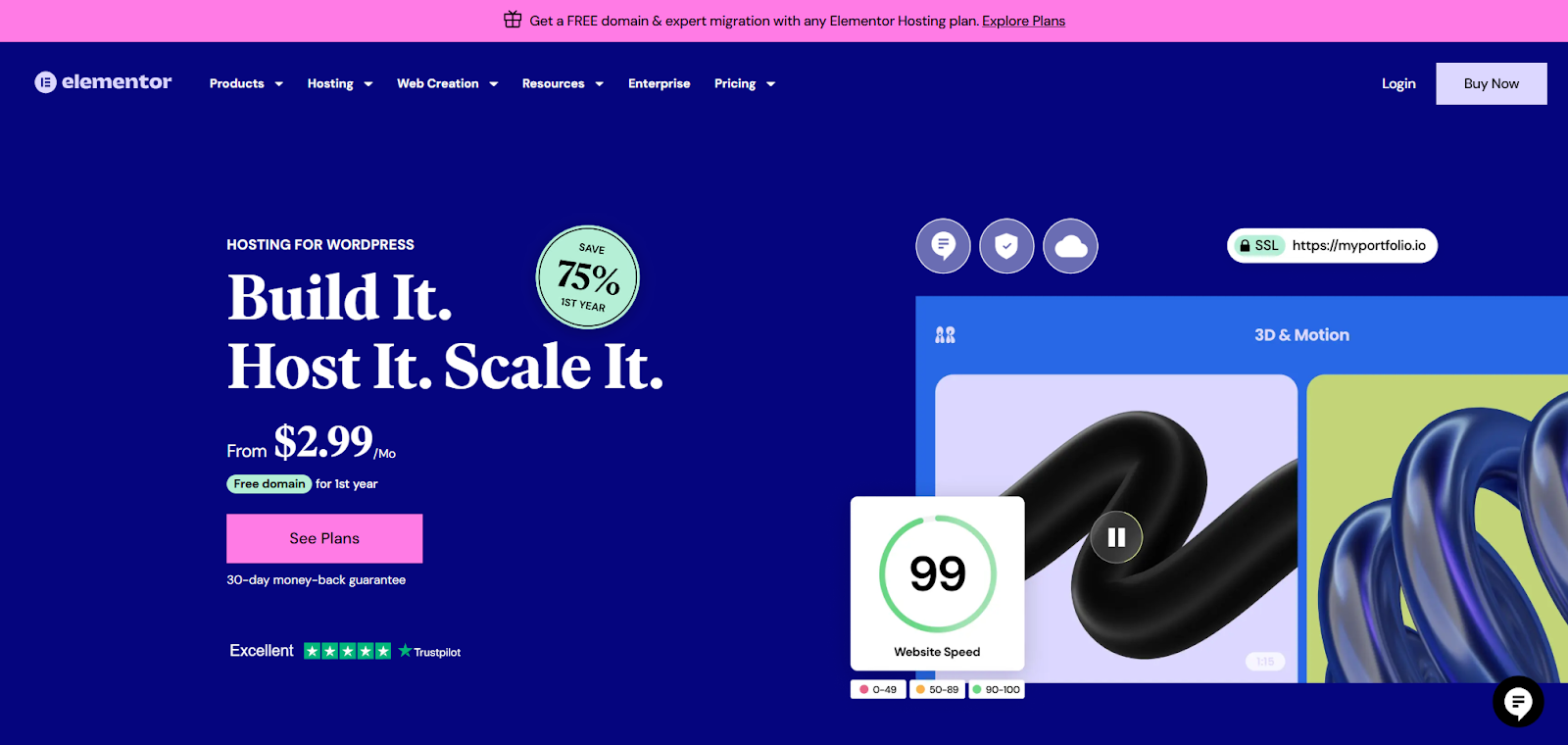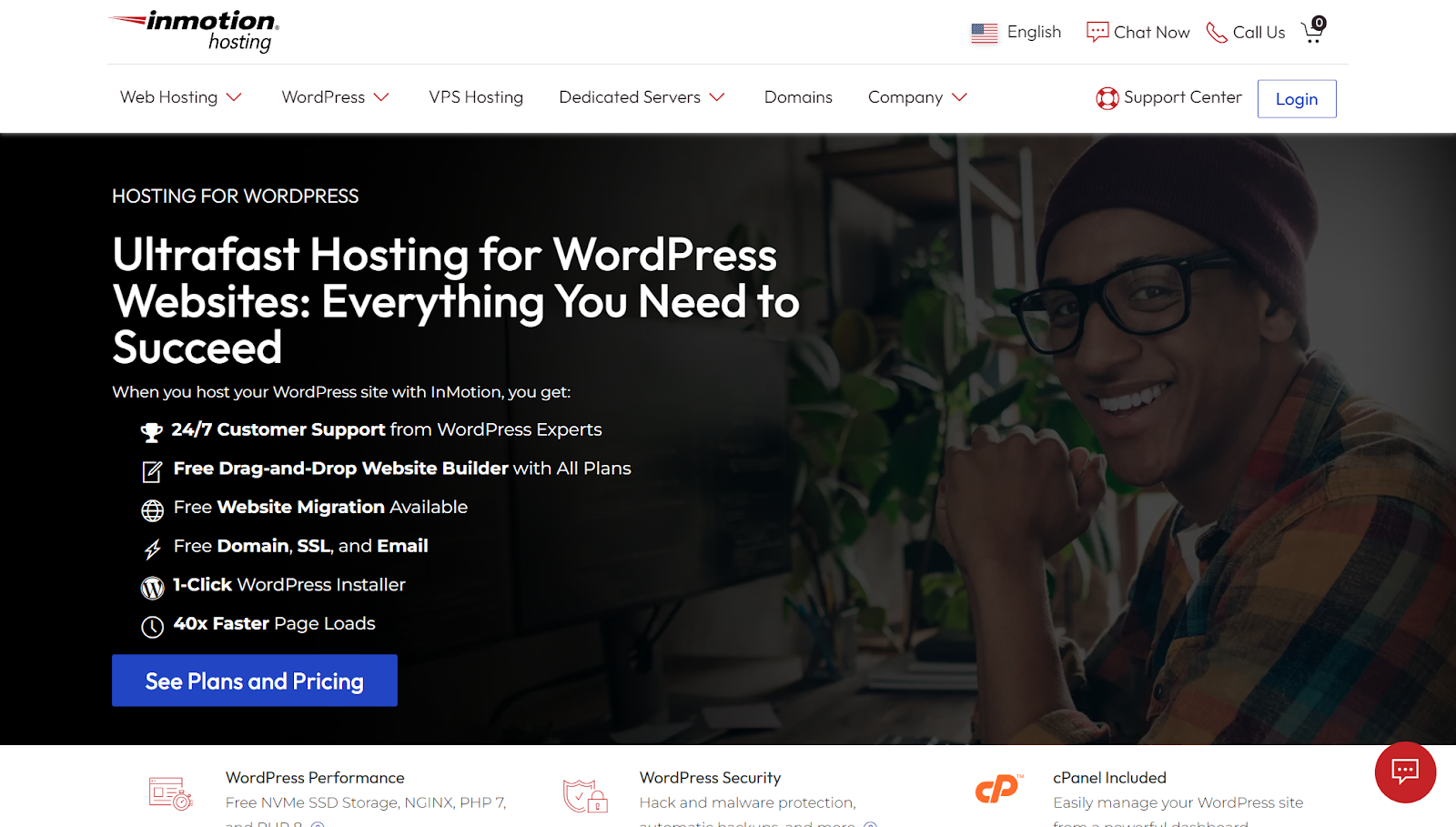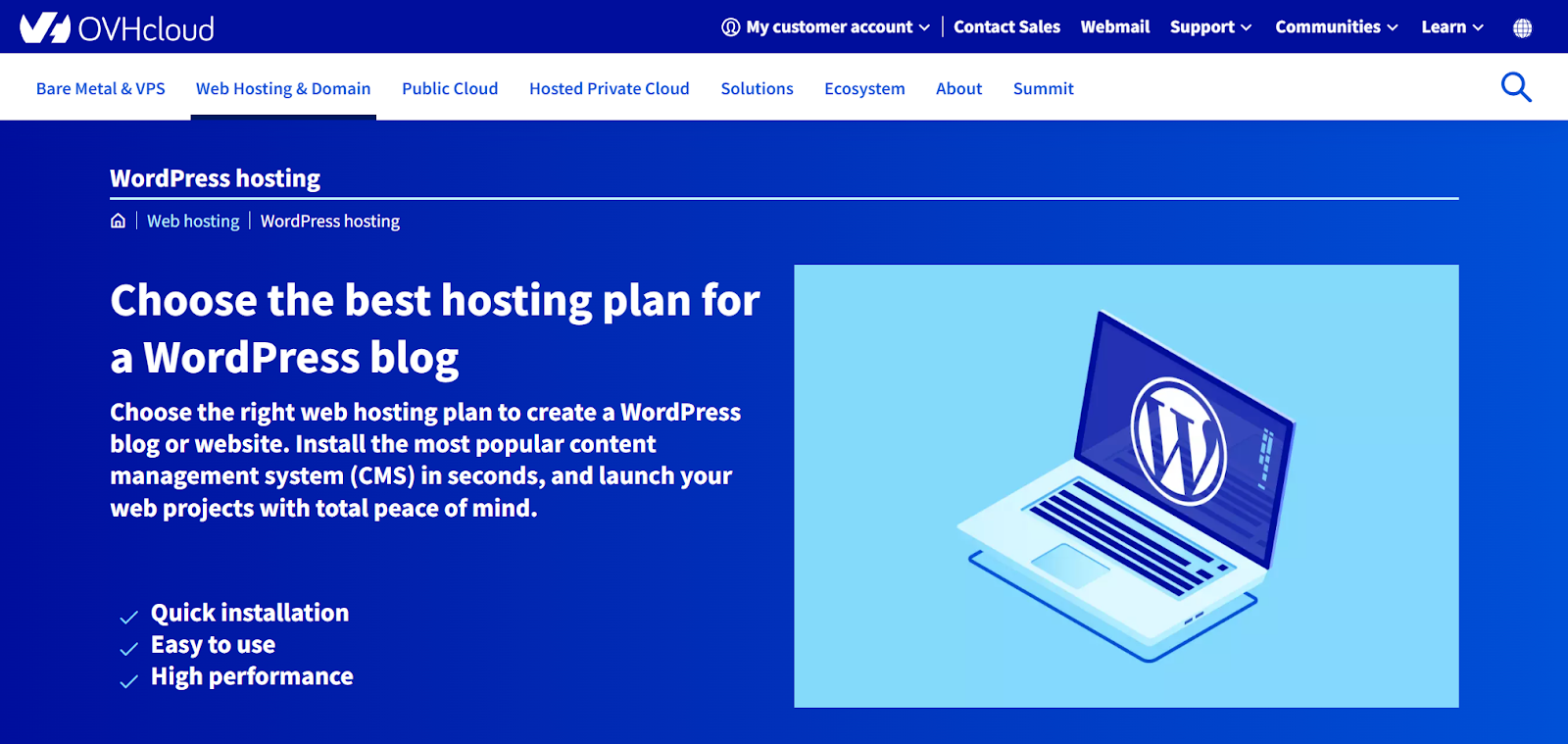Picking the right provider is crucial for your website’s success. It affects speed, security, and how easily you can manage things. With so many options, how do you choose?
Let’s look at three popular choices for 2025: OVHcloud, InMotion Hosting, and Elementor Hosting. We’ll break down their features, discuss migration, performance tuning, security, and peek into the future of hosting. Let’s get started finding the right fit for your website.
OVHcloud vs InMotion Hosting vs Elementor Hosting in 2025
Choosing a hosting provider involves matching their strengths to your specific needs. Let’s explore OVHcloud, InMotion Hosting, and Elementor Hosting in more detail to see where they shine:
Elementor Hosting: All-in-One Solution for WordPress Websites

Elementor Hosting provides a managed WordPress hosting environment specifically designed for websites built with Elementor. Think of it as a tailored suit – built for a specific purpose and fitting just right.
What Makes Elementor Hosting Stand Out?
- Optimized Performance: It runs on the Google Cloud Platform, known for its reliability and speed. Combined with Cloudflare’s CDN (Content Delivery Network) integrated right in, your website content gets delivered quickly to visitors worldwide. This setup aims for fast load times and high uptime.
- Seamless Elementor Integration: This is the core benefit. When you sign up, WordPress and the Elementor Core plugin come pre-installed. This means you can jump straight into building or migrating your site using the familiar Elementor interface. It streamlines the setup process considerably. Remember, Elementor Hosting includes the free Elementor Core version. For advanced features like the Theme Builder, Popup Builder, and additional widgets, you’ll need to purchase an Elementor Pro plan separately.
- Managed Environment: Elementor Hosting handles many technical aspects for you. This includes automatic WordPress updates, daily backups, and built-in security measures. This “managed” approach frees you up to focus on design and content rather than server maintenance.
- Robust Security: Security is a priority. You get a free SSL certificate (essential for HTTPS), automated backups, site lock options, and built-in protection against threats like DDoS attacks. Continuous monitoring helps keep things secure around the clock.
- Ease of Use: The hosting dashboard is designed to be intuitive, especially for Elementor users. Managing your website, domain, backups, and support access is straightforward. Connecting a custom domain is also guided step-by-step.
- Dedicated Support: You get access to 24/7 support from experts familiar with both WordPress and Elementor. This specialized knowledge can be incredibly helpful if you run into issues specific to the Elementor builder.
Who is Elementor Hosting Best For?
Elementor Hosting is ideal for freelancers, agencies, and website owners who primarily use Elementor to build their sites. If you value ease of use, performance optimized for Elementor, and an integrated workflow, it’s a strong contender. The managed aspect is perfect for those who prefer not to handle the technical backend tasks.
Elementor Hosting offers a powerful, convenient, and secure platform built from the ground up for Elementor websites. Its integration, performance features, and managed services make it an attractive all-in-one solution for Elementor creators.
InMotion Hosting: Reliability and Support Focused

InMotion Hosting is a well-established provider known for its reliable performance, extensive support options, and range of hosting plans suitable for various needs, from personal blogs to growing businesses.
Key Features of InMotion Hosting:
- Variety of Plans: InMotion offers a broad spectrum, including Shared Hosting, WordPress Hosting (both classic and managed), VPS Hosting, and Dedicated Servers. This allows users to start small and scale up as their website grows.
- Performance Focus: Many InMotion plans utilize NVMe SSD storage, which is significantly faster than traditional SSDs, leading to quicker load times. They also talk about “UltraStack” configurations optimized for speed, especially on their WordPress plans.
- Customer Support: This is often highlighted as a major strength. InMotion provides 24/7/365 US-based support via chat, phone, and email. They also have a comprehensive online knowledge base.
- Generous Guarantees: They offer an industry-leading 90-day money-back guarantee on most shared and VPS plans, giving you ample time to test their services.
- Included Freebies: Many plans come with valuable extras like a free domain name for the first year, free SSL certificates, and unlimited email accounts on higher-tier plans.
- User-Friendly Tools: Most shared and WordPress plans include cPanel, a popular and easy-to-use control panel for managing files, databases, email, and domains. They also offer one-click installers for applications like WordPress (Softaculous).
- Developer-Friendly Options: For more technical users, InMotion provides features like SSH access, support for programming languages like Python, Node.JS, and Ruby (on specific plans), and Git version control.
- Migration Assistance: InMotion often provides free website migration services, which can be a huge help when moving an existing site from another host.
Who is InMotion Hosting Best For?
InMotion Hosting is a solid choice for small to medium-sized businesses, bloggers, and WordPress users who prioritize reliable performance and excellent customer support. The long money-back guarantee makes it a low-risk option to try. Their range of plans also makes them suitable for users who anticipate needing to scale their hosting resources over time.
InMotion Hosting stands out for its commitment to customer support, reliable performance backed by NVMe storage, and user-friendly tools like cPanel. Its generous money-back guarantee and free migration services make it an appealing option for many website owners.
OVHcloud: Global Reach and Diverse Infrastructure

OVHcloud is a large, global cloud infrastructure provider offering a vast array of services beyond typical web hosting, including public cloud, private cloud, VPS, and dedicated servers, alongside standard shared hosting options.
Key Features of OVHcloud:
- Extensive Product Range: OVHcloud caters to a wide audience, from beginners needing simple shared hosting to large enterprises requiring complex cloud solutions or powerful dedicated servers. Their VPS and Dedicated Server offerings are particularly extensive and competitively priced.
- Global Data Centers: With numerous data centers across multiple continents, OVHcloud allows you to host your website closer to your target audience, potentially improving load times and latency.
- Competitive Pricing: OVHcloud is often recognized for its aggressive pricing, especially on VPS and dedicated server plans, offering significant resources for the cost.
- Scalability: Their infrastructure is designed for scalability. You can often easily upgrade resources like RAM, CPU, and storage, particularly within their VPS and cloud offerings.
- NVMe Storage: Many of their newer VPS and dedicated server plans feature NVMe SSD storage for enhanced performance.
- Anti-DDoS Protection: OVHcloud includes robust DDoS protection with most of their services, helping to safeguard your site against malicious traffic floods.
- Network Capacity: They operate a large global network infrastructure, aiming for high bandwidth and reliability.
Who is OVHcloud Best For?
OVHcloud is attractive for users needing specific server configurations (VPS/Dedicated) at competitive prices, businesses with a global audience, and tech-savvy users comfortable managing their own server environments. Developers and companies looking for cloud solutions beyond simple web hosting will also find a lot to explore.
OVHcloud is a major player with a massive global infrastructure and a diverse portfolio of hosting and cloud services. Its strengths lie in its competitive pricing for powerful VPS and dedicated options, scalability, and built-in DDoS protection, making it a strong choice for technically inclined users and those with specific infrastructure needs.
Grow Your Sales
- Incredibly Fast Store
- Sales Optimization
- Enterprise-Grade Security
- 24/7 Expert Service

- Incredibly Fast Store
- Sales Optimization
- Enterprise-Grade Security
- 24/7 Expert Service
- Prompt your Code & Add Custom Code, HTML, or CSS with ease
- Generate or edit with AI for Tailored Images
- Use Copilot for predictive stylized container layouts

- Prompt your Code & Add Custom Code, HTML, or CSS with ease
- Generate or edit with AI for Tailored Images
- Use Copilot for predictive stylized container layouts
- Craft or Translate Content at Lightning Speed
Top-Performing Website
- Super-Fast Websites
- Enterprise-Grade Security
- Any Site, Every Business
- 24/7 Expert Service

Top-Performing Website
- Super-Fast Websites
- Enterprise-Grade Security
- Any Site, Every Business
- 24/7 Expert Service
- Drag & Drop Website Builder, No Code Required
- Over 100 Widgets, for Every Purpose
- Professional Design Features for Pixel Perfect Design

- Drag & Drop Website Builder, No Code Required
- Over 100 Widgets, for Every Purpose
- Professional Design Features for Pixel Perfect Design
- Marketing & eCommerce Features to Increase Conversion
- Ensure Reliable Email Delivery for Your Website
- Simple Setup, No SMTP Configuration Needed
- Centralized Email Insights for Better Tracking

- Ensure Reliable Email Delivery for Your Website
- Simple Setup, No SMTP Configuration Needed
- Centralized Email Insights for Better Tracking

- Ensure Reliable Email Delivery for Your Website
- Simple Setup, No SMTP Configuration Needed
- Centralized Email Insights for Better Tracking
Selecting the Best Hosting Plan for You
To choose the right hosting plan, consider these key factors:
- WordPress/WooCommerce Optimization: If you’re using WordPress or WooCommerce, look for specialized hosting.
- Website Needs: Consider traffic, storage, and software requirements.
- Future Growth: Choose a plan that allows for easy scaling as your site grows.
- Budget: Balance cost against performance and features, and factor in renewal rates.
- Reliability/Uptime: Look for providers with a strong uptime guarantee.
- Storage Speed: NVMe SSDs offer the fastest read/write speeds.
- Support: 24/7 expert support is invaluable, especially if specialized for your platform.
- Control Panel: Choose a control panel that you find easy to use.
Prioritize reliability, performance, support, and ease of management to find the best hosting fit for your website.
Key Factors for Smooth Hosting Migration
Moving your website to a new host requires careful planning to ensure a smooth transition. Here’s a breakdown of the key aspects:
1. Data Transfer
- Website Files: Transfer via FTP (e.g., FileZilla), File Manager, or host-provided migration tools.
- Database: Export from the old host (usually via phpMyAdmin) and import into the new host’s database.
2. Domain Name (DNS)
Update DNS settings at your domain registrar to point to the new server’s nameservers or A records. DNS changes can take up to 48 hours to propagate globally.
3. Email Hosting
Decide whether to migrate emails to the new host or use a third-party service. Email migration can be complex, so check for host-provided tools or assistance.
4. Downtime Prevention
- Schedule: Migrate during low-traffic periods.
- Test: Upload the site to the new host and test using a temporary URL or local hosts file.
- Old Hosting: Keep the old hosting active until the new site is fully functional and DNS has propagated.
5. Migration Tools
Many WordPress hosts offer migration plugins or services that can automate the file and database transfer, simplifying the process.
Successful website migration involves understanding the data transfer process, managing DNS updates, planning for email hosting, testing thoroughly, and using available migration tools to minimize downtime and ensure a seamless transition.
Boosting Site Performance on New Hosting
Moving to a potentially faster host is a great start, but you can further optimize your site’s speed. Here are actionable tactics:
- Actionable Performance Tuning Tactics:
- Optimize Images: Large images slow down pages. Use tools like TinyPNG or image editing software to compress images before uploading. Choose the right format (JPEG for photos, PNG for graphics with transparency, WebP for better compression). Specify image dimensions in your HTML/CSS to prevent layout shifts.
- Minimize HTTP Requests: Every image, script, and stylesheet requires a request. Reduce the number of elements per page. Combine CSS and JavaScript files if possible (though modern protocols like HTTP/2 reduce the need for this).
- Limit External Scripts: Third-party scripts (ads, analytics, social media widgets) can add significant load time. Use them sparingly and evaluate their performance impact.
- Minify Code: Remove unnecessary characters (whitespace, comments) from CSS, JavaScript, and HTML files. Many caching plugins handle this automatically.
- Using Caching & CDN for Faster Loading:
- Browser Caching: Instructs visitors’ browsers to store static files (like logos, CSS) locally, so they don’t re-download them on subsequent visits. Set this up via server configurations or caching plugins.
- Server Caching: Creates static HTML versions of your dynamic pages, reducing server processing time. Most managed WordPress hosts (like Elementor Hosting) have server-level caching built-in. WordPress caching plugins (e.g., WP Rocket, W3 Total Cache) are also effective.
- Content Delivery Network (CDN): Stores copies of your site’s static assets on servers worldwide. Visitors download files from the server geographically closest to them, reducing latency. Elementor Hosting includes Cloudflare CDN; many other hosts offer it as an add-on or integrate with services like Cloudflare.
- Gains from Cloud Infrastructure Hosting: Hosting on cloud platforms like Google Cloud (used by Elementor Hosting) or AWS often provides better scalability, reliability, and access to advanced performance features compared to traditional shared hosting. Resources can often be adjusted more dynamically.
- Essential Regular Maintenance Routines: Keep your WordPress core, themes, and plugins updated. Remove unused themes and plugins. Optimize your database regularly (remove old revisions, spam comments, transients) using plugins like WP-Optimize.
Achieving peak performance involves optimizing assets like images, leveraging caching and CDNs effectively, minimizing code and external requests, and performing regular maintenance. Choosing hosting with modern infrastructure (like NVMe storage and cloud platforms) provides a strong foundation.
Essential Web Hosting Security Measures
Website security is non-negotiable. Your hosting plays a big role, but proactive measures are crucial. Here’s a checklist of essential security practices:
- Securing Your Site with SSL and HTTPS: An SSL/TLS certificate encrypts data between your server and visitors’ browsers (enabling HTTPS). This protects sensitive information (logins, payments) and builds trust. Most reputable hosts (including Elementor, InMotion, OVHcloud) provide free Let’s Encrypt SSL certificates. Ensure HTTPS is enforced across your entire site.
- Setting Up Your Hosting Firewall Rules: A Web Application Firewall (WAF) filters malicious traffic before it reaches your website. Some hosts offer a WAF service, or you can use cloud-based WAFs (like Cloudflare’s or Sucuri’s). Configure rules to block common attacks like SQL injection and cross-site scripting (XSS).
- Performing Regular Security Checks: Use security plugins (e.g., Wordfence, Sucuri Security) to scan for malware, vulnerabilities, and file changes. Conduct periodic manual reviews of user permissions and configurations.
- Backup Strategies & Disaster Recovery: Regular, automated backups are your safety net. Store backups off-site (separate from your hosting server). Test your restoration process occasionally. Elementor Hosting and many managed plans include automated backups.
- WAF, DDoS & BotNet Defense Explained:
- WAF: Filters application-level attacks.
- DDoS Mitigation: Protects against Distributed Denial of Service attacks that overwhelm your server with traffic. OVHcloud is known for strong DDoS protection; Cloudflare (used by Elementor Hosting) also provides it.
- Bot Protection: Identifies and blocks malicious bots trying to scrape content, brute-force logins, or spam forms.
- Adding Multi-Factor Auth Security (MFA/2FA): Require more than just a password for logins (WordPress admin, hosting account). Use authenticator apps (Google Authenticator, Authy) or security keys for an extra layer of protection.
- Importance of 24/7 Security Monitoring: Choose a host that actively monitors their network for threats. Continuous monitoring helps detect and respond to issues quickly. Managed hosting plans often excel here.
- Keeping Software Safe with Auto Updates: Outdated software (WordPress core, themes, plugins) is a primary target for hackers. Enable automatic updates where possible, especially for security patches. Managed hosts often handle core WordPress updates.
- Secure Database & File Transfer Access: Use strong, unique passwords for your database and FTP/SFTP accounts. Always use SFTP (Secure File Transfer Protocol) or SSH instead of plain FTP, as it encrypts your connection. Limit file permissions appropriately.
- Automatic Security Patch Management: Good hosts apply security patches to the underlying server software promptly. This is a key benefit of managed hosting environments.
- Using Dev/Stage/Prod Environments Safely: Test updates and changes on a staging site (a clone of your live site) before applying them to the production (live) environment. This prevents breaking your live site. Some hosting plans offer easy staging site creation.
- Benefits of Zero Handshake TLS Security: Modern TLS versions (like TLS 1.3) offer improved security and performance features, including faster connection times (Zero Round Trip Time Resumption or 0-RTT). Ensure your host supports current TLS protocols.
Robust web security involves multiple layers: SSL encryption, firewalls, regular updates and scans, strong access controls (MFA), reliable backups, secure protocols, and proactive monitoring. Choosing a security-conscious host and implementing best practices on your site are both vital.
What’s Next for the Web Hosting Industry
The web hosting world is constantly evolving. Here are some key trends shaping its future:
- AI & Automation in Hosting Management: Artificial intelligence is increasingly used for optimizing server performance, automating resource allocation (scaling), predicting hardware failures, enhancing security threat detection, and even powering more sophisticated customer support chatbots. Expect more AI-driven management tools.
- Green Web Hosting & Sustainability: Environmental impact is a growing concern. More providers are focusing on eco-friendly practices: using renewable energy sources for data centers, deploying energy-efficient hardware (processors, SSDs), optimizing cooling systems, and implementing responsible e-waste disposal policies. Customer demand for sustainable options is rising.
- Enhanced Security Measures: With cyber threats becoming more sophisticated, expect continued focus on advanced security. This includes wider adoption of Zero-Trust security models (verifying every access request), AI-powered real-time threat detection and response, and more robust protections against complex attacks.
- Edge Computing Integration: To reduce latency and improve speed for geographically dispersed users, hosting providers are leveraging edge computing. This involves placing server resources closer to the end-users, ideal for applications requiring real-time responses like streaming, gaming, and IoT.
- Serverless Hosting Growth: While not replacing traditional hosting, serverless architectures (where developers deploy code without managing underlying servers) continue to evolve, offering pay-as-you-go pricing and automatic scaling for specific types of applications.
The future of hosting points towards smarter (AI-driven), greener, faster (edge computing), and more secure solutions. Automation and sustainability are becoming key differentiators alongside core performance and reliability.
Conclusion
Choosing the right web hosting provider in 2025 – whether it’s the Elementor-centric Elementor Hosting, the support-focused InMotion Hosting, the globally diverse OVHcloud, or another option – is a critical decision for your online presence. There’s no single “best” host; the ideal choice depends entirely on your specific needs, budget, technical expertise, and website goals.
Consider the factors we’ve discussed: performance requirements (like NVMe storage), WordPress/Elementor optimization, scalability for growth, the importance of reliable uptime and responsive support, security features, and ease of use. Think about migration, ongoing performance tuning, and essential security practices.
By carefully evaluating providers based on these criteria and aligning them with your website’s objectives, you can find a hosting partner that not only supports your site today but also helps it thrive in the future.
Looking for fresh content?
By entering your email, you agree to receive Elementor emails, including marketing emails,
and agree to our Terms & Conditions and Privacy Policy.

